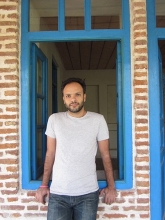Iranian student banned from returning to US despite renewed student visa

A PhD candidate in the Mechanical Engineering Department at the University of South Florida, Mehdi had also worked part-time as a teaching assistant and a resident assistant.
The normal visa procedure for Iranian students is to interview at one of the United States embassies in a country near Iran (there is no U.S. embassy in Iran), then after a lengthy administrative processing receive a single entry visa to the U. S. That means if the student leaves the U.S. during their study and wants to return, they have to start over and get a new student visa.
For family reasons, Mehdi had to leave the USA in the summer of 2016. He had already applied for the new visa at the beginning of May 2016, but his application went through eight months of administrative processing and vetting. During those months, Mehdi was not allowed back into the US. He lost his financial support and had to use his savings to pay for his tuition. Even though he was selected to receive two prizes, he lost them because he couldn't attend the award ceremonies.
Finally, his student visa was approved on 26 January 2017. But two days later, the travel ban barring people from seven predominantly Muslim countries from entering the U.S. for 90 days was enforced. His visa was refused, despite the original approval.
Mehdi is one case among many. When his story went public, he received support but also hateful messages.
"Nobody is born hating other nations, races and skin colors," says Mehdi, "Marking people as terrorists based on the country where they’ve been born is a result of ignorance, misguided education and false information, often on social networks and erroneous news reports."
"I believe teachers can change this, if we each take the time and effort to reach out to students and have constructive conversations. There is no need to argue with people to show that they are wrong or right. But we can introduce the facts and shed light on incorrect information about important subjects. By reaching even one student in each class, we generate more hope for the future of all our nations. We can prevent more people like me from being casualties of ignorance in the future."
Read Mehdi's story here

